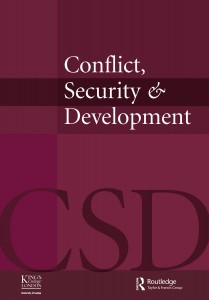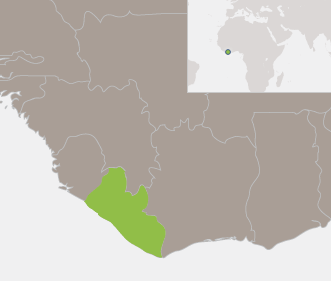The outcomes of programs for disarmament, demobilization and reintegration (DDR) are affected by the way in which they are implemented. More participatory approaches, where ex-combatants feel they have had more say and greater ownership, lead to better results. This is important for how DDR can contribute to the wider peace process and to peacebuilding itself. Establishing trust during DDR – or undermining it when promises are felt to have been broken – is significant for political reconstruction.
—-
 This article is the twelfth contribution in our new Academic Spotlight blog series that features recent research findings on security sector reform and security governance published in international relations academic journals.
This article is the twelfth contribution in our new Academic Spotlight blog series that features recent research findings on security sector reform and security governance published in international relations academic journals.
This contribution summarizes research originally published here:
Walt Kilroy (2014) Does a more participatory approach to reintegrating ex-combatants lead to better outcomes? Evidence from Sierra Leone and Liberia, Conflict, Security & Development, 14:3, 275-308.
As part of the partnership between the Conflict, Security & Development Journal and the Centre for Security Governance, this journal article will be available for six months free and open access exclusively through this link:
http://www.tandfonline.com/doi/full/10.1080/14678802.2014.923151
—-
Among the many demands made on post-war reconstruction initiatives, security sector reform (SSR) and disarmament, demobilization and reintegration (DDR) are regularly called on to ensure there is “local ownership” and “participation” in the process. Who could disagree? Projects must surely be more sustainable, better focused on real needs, and benefit from indigenous knowledge if the people most affected are directly involved in planning and implementing them. It is a tall order, of course, in a post-war environment, and there is always the question of who exactly gets to participate or share in the ownership – especially when there are competing interests and voices, along cleavages which may be part of the original conflict.
However, research published recently in Conflict Security and Development and as a book (Palgrave Macmillan), shows that participatory approaches are not simply a nice aspiration: they can have a real impact on the outcomes for reintegration programs for ex-combatants. This can be seen in terms of their economic situation, work, and relations with the wider community. There is a strong argument as well for saying this is not only about more effective DDR programmes, and that greater ownership can lead to reintegration making a greater contribution to the wider peace process itself. And when it does not go well in terms of participation – especially when there is corruption or the original promises do not work out – it can actually undermine the peacebuilding which it is intended to support.
All this has important implications for how DDR programmes – and other peacebuilding initiatives – are designed, communicated, and implemented. This is not just about a technical fix either. Greater participation means genuinely involving a wider range of stakeholders in real decision making, rather than just communicating decisions better or organizing after-the-fact consultation when everything is in place.
Participatory Approaches in Sierra Leone and Liberia
The research is based on interviews with a wide range of stakeholders in Sierra Leone and Liberia, and a survey of ex-combatants, and focus group discussions with them (two of which were all-female). Participatory approaches are those which genuinely involve people in planning and making decisions about the initiatives which are supposed to help them. The framework used was Pretty’s (1995) ladder of participation: instead of a simplistic all-or-nothing concept, this measures participatory approaches on a scale ranging from tokenism to emancipation. This conceptualization recognizes the many pitfalls and addresses criticisms of how the term “participation” is used: it highlights the way it can in reality amount simply to consultation or extracting information, whereas the higher levels include some shared decision-making. Power, agency, and the important question of who gets to participate are made apparent. This applies in particular to women and girls, who often face greater stigma, and whose voice or position as a war veteran is not acknowledged.
The quantitative data show that those who had a more participatory experience were more likely to be employed, and (reflecting the informal nature of the economy) had more days in work in the previous month. They also rated their own economic situation better than the other ex-combatants. They had better relations with the community where they settled, compared with those who had a less participatory experience. Regression and other analyses showed these differences were statistically significant.
The focus groups and open-ended questions in the survey were also revealing. What really mattered was the sense that a “deal” had been made when they entered DDR, but that this was not always delivered on. What upset ex-combatants most was not the specifics of the benefits they received such as vocational training or education, but the fact that what was promised did not always materialize. This raises the issue of communications and expectations, but even if partly-based on a misunderstanding, the effect was very real. The accounts of unpaid stipends, missing toolkits (intended to set them up in business), or inaccurate information were widespread and colored their perception of the whole program:
What they told us they were going to do, they didn’t do all. We didn’t get any further information from them even when we tried asking what they were going to do for us, they didn’t tell us.
- Focus Group participant, Bo, Sierra Leone
Some even attributed it to deception:
Some of it was lies because what they told us, some was true, some was not true. They told us that during the training we would be given soap money [stipend]. As for me, the place I took my training, they didn’t give a cent for soap money.
- Focus Group participant, Lawalazu, Lofa County, Liberia
An issue which came up repeatedly in the survey and focus groups was corruption and misappropriation of resources for the program, even though this was not asked about or prompted in any way. It clearly undermined their faith in DDR, and in the wider peace process. When asked in the open-ended questions in the survey what they would avoid doing if running a DDR program themselves, the ideas which came up spontaneously again and again were corruption, creating false hopes, lies, and promising too much.
Many of the ex-combatants still face real poverty and unemployment, along with the rest of the population. So were their complaints just generalized disaffection with how things turned out? The data show in fact that they were very discriminating and specific in their criticism of the program. The graph below shows that even those who had no work at all were willing to give a positive rating to how information was presented to them – but were explicit in singling out its accuracy as the problem.
When it came to stipends paid to them during training, the coding frame allowed for complaints about the amount of the allowance. But in the 33,000 words from all 11 focus group transcripts, this was never mentioned. What really mattered was the sense that having been promised a stipend, payments were delayed, reduced, missing or misappropriated, as shown in the table below.
Despite the criticisms, ex-combatants were overwhelmingly positive about the idea of a DDR program in principle. Many saw it not simply as an economic opportunity, but a chance to forge a new identity after whatever happened in the war, and to build a new relationship with the wider community. Failures in terms of poor training left some feeling they could not find a place in the community or be trusted with work they undertook.
From standard DDR blueprint to better peacebuilding
DDR is difficult to implement in an unstable situation. Like so many projects, inevitably there is pressure to use a standard blueprint, show quick results, and meet donor expectations. But this is not simply about getting rid of the guns and keeping the combatants off the streets. It is supposed to help build trust and reinforce the peace process. People quickly infer the “real” rules of the game in what was supposed to be the new Sierra Leone or Liberia. This matters, especially when state capture and poor governance by elites is what created the conditions for war in the first place. How a reintegration program is implemented is as important as what was delivered. If it is done in the wrong way, and teaches people not to trust what they have been told, it can end up undermining the wider peacebuilding project which is its raison d’etre.
The data make clear then that ownership and participation actually matter, rather than being an optional add-on to be bolted on where possible. Reintegration programs can have better outcomes and peacebuilding as a whole moves forward. Good communications, managed expectations, and shared decisions by a range of stakeholders are integral parts of the process. This has real implications for how DDR and other post-war programs are designed, funded, trained for, and implemented.
Dr Walt Kilroy is Associate Director of the Institute for International Conflict Resolution and Reconstruction (IICRR), at Dublin City University in Ireland. His PhD on reintegration of ex-combatants in Sierra Leone and Liberia received the Basil Chubb Prize for best political science thesis in Ireland (2012). The research is also published by Palgrave Macmillan as Reintegrating Ex-Combatants After Conflict (2015). He previously worked in development and in public service broadcasting.
Work Cited
Pretty, Jules N, 1995, ‘Participatory Learning For Sustainable Agriculture’, World Development, Vol. 23, No. 8, pp. 1247–1263.
Tags: Academic Spotlight, DDR, Liberia, Sierra Leone





 Visit the Centre for
Visit the Centre for